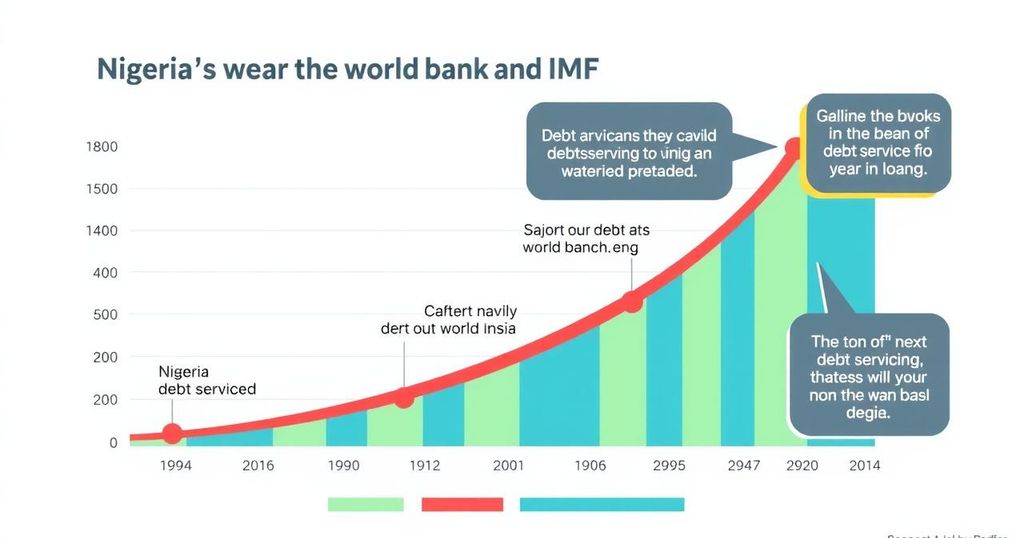Nigeria’s Dramatic Rise in Debt Servicing to World Bank and IMF in 2024

Nigeria’s debt servicing to the World Bank and IMF reached $2.32 billion in 2024, up from $998.92 million in 2023. The increase was largely driven by repayment obligations to the IMF, reflecting a significant shift towards multilateral financing amid fiscal pressure. Consequently, Nigeria’s total external debt stock rose to $45.78 billion, indicating a growing reliance on development loans in contrast to other financial avenues.
In 2024, Nigeria allocated $2.32 billion to service its debt to the World Bank and the International Monetary Fund (IMF). This reflects a substantial increase from the previous year’s payments of $998.92 million, as highlighted by data from the Debt Management Office. The payments consisted of $689.44 million to the World Bank and $1.63 billion to the IMF, largely driven by principal repayments.
The breakdown for the World Bank included $663.23 million to the International Development Association and $26.21 million to the International Bank for Reconstruction and Development. Comparatively, the total amount paid to the World Bank in 2023 was $597.19 million, alongside $401.73 million disbursed to the IMF. This marked a rise of over 134 percent in total payments to these institutions year-on-year, primarily due to increased repayments to the IMF.
Nigeria’s total external debt servicing for 2024 was recorded at $4.66 billion, a rise from $3.5 billion in 2023. Among these, multilateral creditors received the largest share, totaling $2.62 billion or 56 percent of the overall debt servicing. Specifically, payments to the IMF accounted for 35 percent of the total external debt servicing in 2024 and 62 percent of payments to multilateral lenders.
Payments to commercial creditors decreased slightly to $1.47 billion in 2024 from $1.93 billion the previous year, while bilateral creditors received $570.67 million, a notable increase compared to $344.57 million in 2023. Despite the decline in commercial servicing, the escalation in payments to multilateral lenders, primarily the IMF, was significant.
The International Development Association constitutes Nigeria’s most significant multilateral creditor, having received over $663 million in 2024, with a breakdown of $414.86 million in principal repayments and $248.10 million in interest. Payments to the International Bank for Reconstruction and Development also rose due to climbing interest charges.
In 2024, the combined payments to the IMF and World Bank represented 49.8 percent of Nigeria’s total external debt servicing, an increase from 27.8 percent in 2023. This trend illustrates the growing reliance of Nigeria on multilateral support, imposing heavier burdens on the country’s fiscal resources amidst fragile revenue generation and currency pressures.
The report from Sunday PUNCH revealed that while Nigeria’s debt to the World Bank rose by $2.36 billion in 2024, obligations to the IMF saw a drastic decline of $1.67 billion. This discrepancy highlights fresh disbursements from development institutions coinciding with repayments of emergency support facilities.
As of December 31, 2024, Nigeria reported a total external debt stock of $45.78 billion, an increase from $42.50 billion the previous year, primarily attributable to new borrowings from the World Bank Group. By the end of 2023, Nigeria’s obligations to the World Bank were $15.45 billion, which grew to $17.81 billion by December 2024, indicating a growth of 15.3 percent year on year.
The rise in Nigeria’s debt to the World Bank significantly outpaced overall growth in multilateral debt stock. Notably, debt to the IMF decreased from $2.47 billion in 2023 to $800.23 million in 2024, a reduction of 67.6 percent, attributed to repayments linked to emergency funding provided in previous years.
In 2024, loans from the World Bank constituted 79.8 percent of Nigeria’s total multilateral debt, an increase from 73.1 percent the prior year. In the context of total external debt, the World Bank’s share rose to 38.9 percent from 36.4 percent. Conversely, IMF loans declined in percentage shares of total multilateral and external debt.
The cumulative contributions from the World Bank and IMF accounted for $18.61 billion, or 83.4 percent, of Nigeria’s total multilateral debt in 2024. Despite a marked increase in total multilateral debt stock, their combined share of total external debt slightly decreased to 40.6 percent.
This elevation in World Bank exposure emphasizes Nigeria’s reliance on concessional loans, which offer low rates and longer repayment terms, typically funding infrastructure and social development initiatives. Recently, during the inaugural Corporate Governance Forum organized by the Ministry of Finance, Nigeria’s Minister of Finance and Coordinating Minister of the Economy, Wale Edun, articulated a strategic shift from debt to equity generation and emphasized the importance of public-private partnerships for optimizing state-owned enterprises.
In summary, Nigeria’s debt servicing to the World Bank and IMF surged to $2.32 billion in 2024, a significant increase from the prior year. This change is indicative of the nation’s growing dependency on multilateral institutions amidst financial pressures. The shift towards equity investments and public-private partnerships, as articulated by the Finance Minister, reflects an evolving approach to managing fiscal resources while navigating external debt obligations effectively. The continuous rise in external debt underscores the need for sustainable economic strategies to bolster revenue generation.
Original Source: punchng.com








